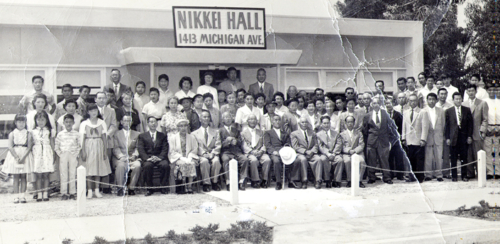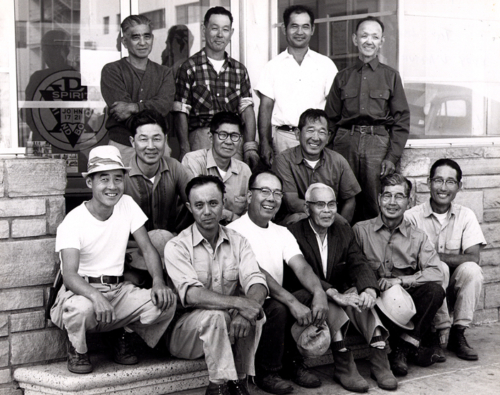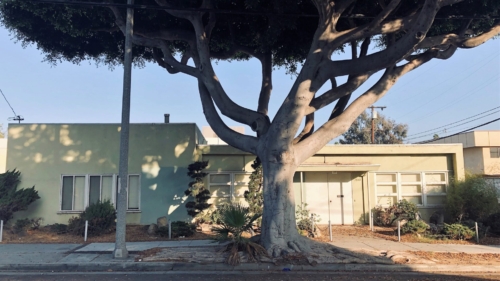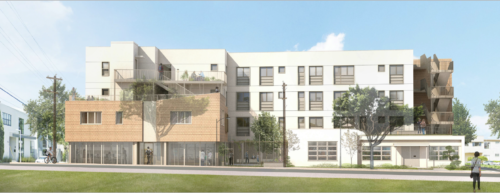News
Nikkei Hall Revived in Affordable Housing Project
by Livia Cavallo, Lead Designer, KFA Architecture
On August 24, 2020, the Santa Monica Landmarks Commission approved a new affordable housing project on the site of the landmarked Nikkei Hall at 1413 Michigan Avenue. The proposed project will be built on the parking lot of the building and will integrate the former community center into the design. The project includes the rehabilitation of the landmark to the Secretary of the Interior’s Standards and seeks to highlight the historic site for greater public visibility and appreciation.

A commemorative photo taken in front of Santa Monica Nikkei Hall upon its completion in 1957. Photo: The Rafu Shimpo
Japanese immigrants first established a community in Santa Monica in the early 1900s with a thriving fishing village in the Santa Monica Canyon. The Japanese-American community expanded throughout central Santa Monica and Ocean Park with many transitioning into agriculture, gardening and nursery services.
With the advent of World War II, they were forced into internment camps, which resulted in the loss of their businesses and homes. When they were able to return to their previous neighborhoods, fewer than 200 Nikkei returned to Santa Monica. They rebuilt their community in the Pico Neighborhood.
In 1951 a group of Issei (Japanese-born immigrants) leaders formed the Santa Monica Nikkei Hall, Inc. and purchased property at 1413 Michigan Avenue. Santa Monica Nikkei Hall was built in 1957 to house the activities of the social organization of the same name. The architect was Yoshimi Tom Makino, who was also incarcerated during the war.
The modest one-story social hall and residence was designed in the architectural style known as Mid-Century Modern Institutional. It was here that their families gathered and socialized, connecting with their heritage, celebrating holidays, conducting funerals and receiving support services. As its membership grew, an addition was constructed in 1969. A decade later the use of the hall decreased significantly as these families began to move out of the area. By 2017 the Hall dwindled to only a handful of members. The property was sold.
The Landmarks Commission initiated and designated the shuttered community center as a historic landmark in 2018 for its cultural significance. The structure was saved from demolition when a member of the Landmarks Commission familiar with local history reported the significance of the modest building in the lives of the City’s historic Japanese-American community.
With the purchase of the corner lot by nonprofit organization EAH Housing in 2019, the Nikkei Hall entered a new phase. The historical building is being incorporated into The Laurel, a 58-unit affordable housing project designed by KFA Architecture. It is scheduled to begin construction in the fall of 2021 and will be completed in spring of 2023. The integration of a modest historical building into a larger contemporary complex required particular care and an approach rooted in respect, deference and creating an architectural and spatial dialog between new and old.
The historical building is separated from the surrounding L-shaped structure by a central courtyard, providing a green buffer between the structures and a gathering space for tenants. The new building steps down at the corners, reducing the mass toward Michigan Avenue and allowing light to penetrate to the center of the project and Nikkei Hall, and is canted deferentially to the historic structure. The larger mass behind Nikkei Hall features subtle references to its design, including horizontally oriented panels to pick up on the lines of the character-defining windows at the front of the hall. The historic building will be rehabilitated as a manager’s unit and a community room, establishing a line of continuity in the use of the Hall.
As a whole, the Japanese community center will receive more of the attention it deserves with a respectful larger building and landscaped open space surrounding it, rather than being surrounded by a large parking lot. The Landmarks Commission gave its enthusiastic support for the project and unanimously approved the design. Nikkei Hall’s status as a landmark will be enhanced by proper refurbishment, adaptive reuse and the complementary design of the new structure, as well as being part of a project providing much needed affordable housing for the City.
This entry was posted in Advocacy and tagged Adaptive ReuseNikkei Hall.
Bookmark the permalink.


